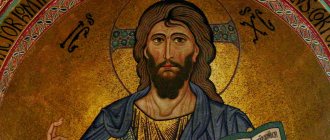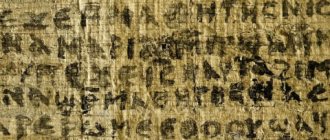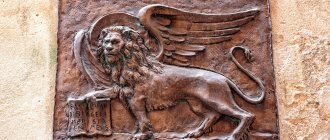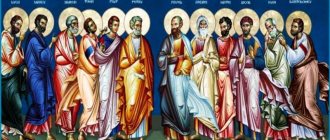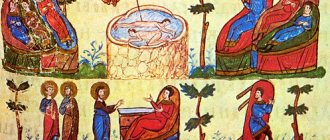The Bible, which includes the Old and New Testaments, became the basis for many creeds. This collection of texts is sacred to Jews and Christians. However, in Judaism the main book is considered to be the first part, and in Christianity - the Gospel or the New Testament. Jehovah's Witnesses, who are they - Christians or sectarians distorting the meaning of the Bible?
Who are Jehovah's Witnesses?
Jehovah's Witnesses are a religious faith based on the Bible, but fundamentally different from all Christian religions. In some aspects of the doctrine there are close parallels with Protestantism (Baptists, Adventists, Pentecostals), but these concern only minor details.
Jehovah's Witnesses - history of origin
The Jehovah's Witnesses organization originated at the end of the 19th century in the city of Pittsburgh in Pennsylvania, USA. Its founder, Charles Taze Russell, was interested in religion and at the same time “secret teachings” from a young age. Since childhood, he attended an evangelical church; by the age of 17, he began to doubt the correct interpretation of the Bible and the truth of the concept of the immortality of the soul. Subsequently, he became interested in the ideas of Adventism, which at that time was very popular in the USA. Historical significant dates for the founding of the sect:
- 1870 - creation of a society for the study of the Holy Scriptures called the “Bible Circle”;
- 1884 – official registration of the religious organization “Zion’s Watchtower Society”;
- 1931 - the organization splits into two separate societies, Jehovah's Witnesses and Bible Students.
Leader of Jehovah's Witnesses
The sect is organized according to the principle of hierarchy or theocracy, as the Jehovah's Witnesses themselves call it. At the head of the entire community is a collective body - the Governing Council, which has the highest powers. The head of the council is the elected president. Subordinate to the governing body are six committees, each of which performs a strictly defined function.
Since 2016, the main center of the organization has been located in the small American town of Warwick in New York State. The leader of Jehovah's Witnesses, Don Alden Adams, is currently continuing the sale of real estate acquired by the community in Brooklyn. For 85 years the community's headquarters were in this city. In every country and region where there is no ban on the organization’s activities, there is a separate branch of Jehovah’s Witnesses.
Expansion of "Society"
After Russell's death in 1916, Joseph Franklin Rutheford took control of the Watchtower Society and brought followers, and therefore money, into the Society. Rutheford launched the second largest Jehovah's magazine, Awake! and published his own book, “Millions of People Living Now Will Never Die.” In it, he outlined a new concept, according to which Christ has ruled in heaven since 1914, and Armageddon will occur in 1925. The result is a little predictable - Armageddon did not happen. But what happened was the fabulous wealth of Rutheford and the spread of the teachings of the Watchtower Society to the masses. By the way, it was under Rutheford that a split occurred: those who broke away retained the name “Bible Students,” and those who remained with Rutheford became “Jehovah’s Witnesses.”
By and large, under Rutheford, the formation of a stable creed of Jehovah's Witnesses, which has survived to this day, was completed. The only thing worth mentioning is the publication of the New World Translation, a book with a very loose translation of the Holy Scriptures, which smoothed out the corners that Jehovah's Witnesses needed. Experts note that among the translators listed in the book, there is not a single expert in any Hebrew languages, and there is only one person who has completed preparatory courses in Greek.
How do Jehovah's Witnesses differ from Orthodox Christians?
Without detailed study, it is difficult to understand what Jehovah's Witnesses believe. This is due to the fact that throughout the existence of the organization, its doctrines have been changed and adjusted more than once. For example, Jehovah's Witnesses have already loudly warned the world several times about the impending end of the world. Jehovah's Witnesses, who they are and how their faith differs from the Orthodox:
- Followers of the teaching study and interpret the Holy Scriptures in their own way, considering only their own interpretation to be truly correct. They recognize only the Bible, ignoring all other writings (including the apostolic ones), because they do not come from God, but from people. At the same time, they themselves constantly publish literature based on biblical texts and supplemented with their own inventions.
- For adherents of Jehovah's Witnesses, the terms “Creator” and “Lord” are not worthy terms to refer to God. They consider them only titles and address the Almighty only by the name Jehovah.
- Adherents of the sect perceive Christ as the incarnation of Archangel Michael.
- Jehovah's Witnesses believe that the execution and resurrection of Jesus Christ is not salvation from the sins of mankind. In their opinion, Christ generally rose not physically, but spiritually, and atoned only for the original sin of Adam and Eve.
- Jehovah's Witnesses have absolutely no concept of an immortal soul.
- Jehovah's Witnesses do not recognize the concepts of heaven and hell. According to their belief, heaven will come on Earth after the end of the world and only those who have been pardoned or those who have served God will enter it.
- Adherents of the community claim that the second coming of Christ has already occurred, as well as the appearance of Satan. Therefore, in the near future they expect the end of the world and the judgment of people, which has been predicted more than once.
- The sect does not have icons, they do not recognize the sign of the cross.
Orthodox Life
Although many books have already been published about Jehovah's Witnesses, written not only by theologians and religious scholars, but also by former members of the organization themselves, unfortunately, its ranks still continue to be replenished by those people who are little aware of the real activities of the Watchtower Society.
The purpose of this publication is to warn those who are attracted by these very smiling representatives of this community who offer to study the Bible together.
Of the representatives of non-traditional religiosity who abundantly filled our spiritual space at the end of the last century, the most recognizable were and remain to this day Jehovah's Witnesses and, perhaps, Mormons. They are always visible from afar. Some – by a specific dress code and the “Book of Mormon” in their hands, others – by their constant stands, which they constantly place in public places in order to attract attention. However, followers of any other religious organizations do not possess such obsessiveness and persistence as members of the Watchtower Society. They carry out their “missionary” work not only with enviable tenacity, but also with ingenuity: when doors are no longer opened for them, they send letters and invitations, make phone calls, try to start a conversation through the intercom, and stop them on the street. They like to be most active on the eve of Orthodox holidays. One day, one witness managed to “catch” me even in a pharmacy, when I was standing in line with a severe headache and was only thinking about how to buy medicine as quickly as possible. Suddenly a question came from behind me: “Why do you think people get sick? Do you think this is inevitable?
From the window of my house I can see the path on which they have been regularly standing with their literature for the purpose of “catch” for about ten years now. True, after in a number of countries, and especially in neighboring Russia, the organization “Society of Jehovah’s Witnesses” was prohibited at the legislative level, their preaching zeal decreased somewhat and they stopped openly picking on passers-by.
Adherents of the Watchtower Society, like many other sectarians, have their own weak point: their faith and religious thinking fit only within the boundaries and standards imposed by the organization. If the interlocutor manages to puzzle or push the Jehovah's Witness beyond these boundaries with his question, he will retreat and will not continue the dialogue with you. Jehovah's Witnesses do not like arguments to which they have nothing to argue. After all, the entire life of the members of this community is completely regulated by a set of unwritten rules that are unacceptable to break. Work in an organization is structured in such a way that a person has learned to think independently and cannot have his own opinion, as well as make independent decisions. Each Jehovah's Witness is thought for by their “think tank” – the Governing Body (or “Governing Body”).
I have always been amazed at the audacity with which they enter into dialogue, trying to teach someone, without knowing the answers to questions regarding their own doctrines. More than once I have encountered the fact that adherents of this community are poorly oriented or do not know the history of their movement at all. When asked about a number of miscalculations regarding unfulfilled prophecies or unpleasant facts from the life of their ideologists, they begin to dodge or answer categorically and confidently: “That didn’t happen.”
Jehovah's Witnesses have completely forgotten how, at the very beginning of the last century, they promised millions of people on earth who lived at that time that they would never die and would witness the resurrection of Abraham, Isaac, Jacob, etc. In fact, forgetfulness and lies are the characteristic properties of this an organization that, as necessary, regularly reviews and streamlines its teachings. And this applies not only to predictions about the next Armageddon, the “exact” dates of which have been set 13 times over the years of the existence of witnesses, but also to other issues. For example, bans on vaccinations and organ transplants that existed until a certain time and were then lifted; ban on blood transfusions from 1945 to 1993. In 1994, the leadership of the Watchtower Society changed its decision under public pressure and allowed the use of small fractions of blood, with the publication of special tables, shifting the final decision on this issue to the conscience of the Jehovah's Witnesses themselves, many of whom, however, still refuse blood transfusions.
The organization “Society of Jehovah's Witnesses,” for all its apparent openness, is in fact a rather closed association. Even being inside it, most members do not know the whole truth, and so that adherents do not have any desire to know this truth, conditions of information isolation are created for them. They practically do not read any other literature, except for magazines and small books published by the community. It is also discouraged to read their own old publications, in which certain doctrines do not agree with their current interpretation. Behind their feigned friendliness and imaginary goodwill lies a very hostile attitude towards the outside world.
Jehovah's Witnesses deny any earthly government, military service, Christian holidays, and consider themselves citizens of a single theocratic state centered in Brooklyn. I often remember one of my former employees, Lyudmila, who worked as a junior nurse in our hospital department. She was always quite open, smiling and sociable. Suddenly, at some point, it was as if she had been replaced: she began to avoid everyone, became withdrawn and unsociable. After some time, she had a misfortune: her husband and granddaughter fell under the wheels of a truck. The husband died on the spot, the girl could have been saved, but she needed surgery and a transfusion of one of the blood components. The granddaughter had a rare 4th blood group and was Rh negative. Finding a donor for such a person is a big problem. Our manager decided to help and began calling all blood transfusion stations to find the red blood cell mass necessary to save the child, but Lyudmila protested and said rather persistently that there was no need to look for anything. Let it be as it will be. If the granddaughter dies, it means that Jehovah has decided so. At that moment, it became clear to everyone why Lyudmila had changed so much - she joined the sect of Jehovah's Witnesses.
They also do not like revelations and do not like those who, having lost faith in their teaching, seek to leave the association or try to defend their point of view on a particular issue. Or rather, they are afraid of such people, exclude them from their midst and forbid others to communicate with them, so that, God forbid, it would not occur to anyone else to get closer to the Truth.
One day we had a conversation with two witnesses at our home, during which I offered them to read the then recently published book “Crisis of Conscience,” written by Raymond Franz, a former member of the Governing Body of Jehovah’s Witnesses, who left after a thorough study of the doctrines. "Watchtower Society." The witnesses looked at me with horror: “What are you saying, we won’t read such lies!” To my question, how do they know that there is a lie there, if they haven’t read it, a very characteristic answer was given: “The older brothers told us. We are not interested, we don’t read books of traitors!” Raymond Franz, whose life from birth to 60 years was inextricably linked with Jehovah's Witnesses, knew all their ins and outs from the inside and had access to information that was closed to ordinary members of the organization. At some point, the doctrines and decisions made by the Governing Body came into conflict with his conscience. This is how his first revealing book appeared. Its members are afraid like hell. Disappointment is one of the reasons why adherents who have been in an organization for a long time still leave it.
In general, any critically thinking person is a threat to the community, because such people, as a rule, leave and take others with them. This, for example, happened with the 34th President of the United States, Dwight Eisenhower, who, like his parents, was until a certain point a member of the Watchtower Society. But when in 1919, the head of the organization, Rutherford, began to rewrite and remake unfulfilled prophecies in a new way, Eisenhower’s father became disappointed, reconsidered his views and left, followed by his sons. By the way, Eisenhower subsequently tried in every possible way to hide information about his affiliation with the organization, fearing that this could cost him the presidency. The Watchtower Society is one of the largest organizations in terms of numbers among all representatives of new religious associations of a destructive nature that use mind control of their members. It arose in the 80s of the 19th century thanks to the efforts of the self-taught American preacher Charles Russell. Calling themselves Christians, the Jehovah's Witnesses completely distorted all the main points of Christian teaching. They, like the once heretical Arians, deny the divinity of the Savior, and therefore the Trinity of God. The doctrine of the Trinity is considered a “satanic” and “pagan fabrication.” For Jehovah's Witnesses, Christ is just the perfect, highest creation of God, which they identify with the Archangel Michael. To substantiate this point of view, followers of the community constantly appeal to the name “Son of Man,” ignoring or interpreting in their own way all the quotations of the Holy Scriptures that speak of Christ as God. All their misconceptions regarding the Savior are related to the fact that they do not recognize two natures in Him: Divine and human. Followers of the community dispute the physical Resurrection of Christ. The Holy Spirit, according to the ideas of Jehovah's Witnesses, is just the invisible force of the Creator, prompting his servants to fulfill the will of God, but not the Third Person of the Holy Trinity. They do not believe in the posthumous existence of the human soul. Jehovah's Witnesses do not recognize the baptism of children. The main point in the teaching of the witnesses, on which, in fact, their entire structure is based, is the question of the Second Coming of Christ and the thousand-year kingdom on earth. To prove their false teaching, the Jehovah's Witnesses created their own Bible, the New World Translation of the Holy Scriptures, which completely distorts the Hebrew and Greek texts.
When communicating with adherents of this sect, a logical question always arises: why are people who consider themselves Christians called Jehovah's Witnesses? They completely reject the well-known and indisputable fact that their very name arose as a result of the scandal and schism in the Watch Tower Society in 1931, and then, as they say, in hindsight, Rutherford justified it with a biblical quotation from the book of the prophet Isaiah (43: 10–12), which has nothing to do with Christians. From this point on, the doctrines of the witnesses began to increasingly shift away from the primary importance of Christ towards the word “Jehovah”. However, the word “Jehovah” is an artificially created name of God, one of the inauthentic variants of the pronunciation of the name of God Yahweh, established as a result of the fear of the Jews to violate the third commandment of the Decalogue. It is formed by merging the Old Testament unreadable Tetragrammaton and vowels from the word “Adonai” (“Lord”). The Hebrew idiom for the name Jehovah is translated as “He who is.” God gave this name of His so that people would have a true understanding of the Being of God, but this is not His only name mentioned in the Holy Scriptures. The most interesting thing is that Christ nowhere calls God Jehovah, although he clearly testifies to His disciples: “I have revealed Your name to men” (John 17:6). If, following the logic of the Watchtower adherents, the only name of God is Jehovah, then why doesn’t the Savior Himself speak about this? Addressing God as “Father,” He also commands others: “Pray like this: Our Father who art in heaven...” (Matthew 6:9). So, whose witnesses are the “Christian” Jehovah’s Witnesses is not clear.
Throughout the history of their existence, Jehovah's Witnesses have been accompanied by various international scandals, which they do not like to remember and from which they carefully dissociate themselves. The most famous are the “Declaration of Facts” adopted at the Berlin Congress in 1933 and the letter to Hitler. However, despite the assurances of the then leadership of the Watchtower that the community approved and emphasized the highest ideals held by the national government of the Reich, the documents and the flirtations of witnesses with the Nazis did not help them at all, but only tarnished their reputation forever and intensified persecution. Another scandal was associated with the entry of Jehovah's Witnesses as a non-governmental organization into the UN, which they demonized for many years and declared “a monster from the book of Revelation.” It was only after the exposure of English journalists that the associated status of the Watchtower Society with the UN was urgently revoked.
Many Watchtower Society publications claim: “Jehovah’s servants... are the happiest people on earth.” But one can hardly be happy in the world of absurd, deceitful and dangerous illusions that this organization creates for its adherents. Hence the question: do the true God need such servants?
Valentina Novikova
What do Jehovah's Witnesses preach?
Jehovah's Witnesses claim that after the Day of Judgment, heavenly life will begin on Earth. In their opinion, Christ, as the messenger and representative of God, will judge people and weed out sinners who will die forever. The main difference is faith in the one Old Testament God, Jehovah (Yahweh). For uninitiated people, it is difficult to understand who Jehovah is. In the interpretation of the sect’s adherents, he is the only God with whom one can and should build personal relationships. “Draw close to God, and he will draw close to you” (James 4:8).
In all Christian denominations, the absolute postulate of faith is the triune essence - Father, Son and Holy Spirit. Jehovah's Witnesses deny the divine origin of Christ, while recognizing his important role. Jehovah's Witnesses do not believe in the atonement for sins that Jesus provided through his sacrificial death on the cross. Jehovah's Witnesses do not recognize the existence and significance of the Holy Spirit at all.
The king and the sorceress
In the book of Kings we read that, agonizing in anticipation of a great misfortune, King Saul turned to a sorceress (spiritualist), who was engaged in summoning the souls of the departed (which was an abomination before God). We read: “Then the woman asked: whom should I bring out to you? And he answered: “Bring out Samuel to me” (1 Sam. 28:11), and further: “...an old man comes out of the land, dressed in long clothes. Then Saul knew that it was Samuel, and fell face down on the ground” (1 Sam. 28:14). The sorceress, according to custom, wanted to summon a certain ghost, the nature of which she could only guess, but she saw someone whom she did not expect to see at all. If the sectarians were right, and it was an ordinary spiritualistic session, at which a demon appeared in the guise of Samuel (after all, the sorceress could not, indeed, summon the spirit of the righteous!), then her reaction is incomprehensible, for she was accustomed to communicating with fallen spirits. But contrary to the expectations of the spiritualist herself, a real miracle happened: God clothed Samuel’s disembodied soul in some semblance of a body in order to once again express to the apostate His unyielding will about him and his descendants: “... why do you ask me, when the Lord departed from you and became your enemy? The Lord will do what He spoke through me; The Lord will take the kingdom out of your hands” (1 Sam. 28:17).
If the sectarians (Jehovah's Witnesses, Adventists, etc.) were right, then the demon could give a true prophecy of “what will happen” before it happened by the will of God. But demons serve their master - the father of lies, which is why they are so consistent in untruth. Only God could create a true miracle or allow it to happen among even the wicked for the final judgment and sentence. It is to this event that Jesus, the son of Sirach, testifies: “He prophesied even after his death, and predicted his death to the king, and in prophecy he lifted up his voice from the earth, that the lawless people would be destroyed” (Sir. 46:23). And even if we agree with the position of the “witnesses” that this information was revealed to man by demons, then again we must recognize the fact of the existence of the subject himself (who was possessed by a demon), who perceives demonic suggestions after the death of the bodily shell.
What should Jehovah's Witnesses not do?
The rules of Jehovah's Witnesses are very strict. A clearly constructed system of internal hierarchy leads to total surveillance and control over compliance by members of the organization with the main prohibitions:
- Political neutrality, even to the point of ignoring all elections and public events.
- Absolute denial of killing, even for the purposes of defense and self-defense. Jehovah's Witnesses are forbidden to even touch weapons. Their faith does not even allow them to serve in the army; conscripts choose alternative options for service.
- Ban on blood transfusions and vaccinations. Adherents of the sect exclude the possibility of blood transfusion, even if life depends on it. This is explained by the biblical prohibition and the fear that the blood of Satan will enter the body.
- Denial of holidays. For Jehovah's Witnesses there are practically no holidays, including religious, secular and personal dates. The exception is the Evening of Remembrance of the Death of Christ. They consider the rest of the holidays to be pagan, because there is no mention of them in the Bible.
Why are Jehovah's Witnesses dangerous?
The Jehovah's Witnesses sect is extremely obsessive. Jehovah's Witnesses pester passers-by on the street and freely go from house to house, preaching under the pretext of studying the Bible. The problem is that their interests go much further than their idiosyncratic interpretation of biblical texts. They impose their vision of a society without politics and governance, subject exclusively to God alone (theocracy). In achieving their goals, they do not deny the possibility of family destruction, betrayal of loved ones who do not support their views.
Why are Jehovah's Witnesses considered extremists?
At first glance, it is unclear what the extremism of Jehovah's Witnesses is; they do not advocate violence. However, according to lawyers, the radical attitude of Jehovah's Witnesses poses a danger to society. A person who does not join their ranks is considered an enemy. An important factor of danger is that due to the ban on blood transfusions, not only the adherents of the sect themselves die, but their relatives. This is especially true for children, when fanatical parents refuse medical care; this is one of the reasons why Jehovah’s Witnesses were banned in some regions of the Russian Federation.
Ivan (name changed), 35 years old
When I was 11 years old, my father took me to my first meeting of Jehovah's Witnesses. By that time he no longer lived with us. My mother also went to the meeting, but rather just out of curiosity. What fascinated me most was the idea of Jehovah's Witnesses about eternal earthly life: they believe in personal physical immortality in heavenly conditions. At that age, I thought about death, imagined how terrible it would be if my grandparents suddenly passed away. It was all the more creepy to think about my own inevitable non-existence. And then they offered a wonderful alternative, and I took the bait.
My mother and I began going to meetings, and two young Jehovah’s Witnesses began studying the Bible with us at home using a special manual. Each chapter is a topic: “What is the Kingdom of Heaven?”, “Why did Jesus Christ come and die?” - and so on. They came to us a couple of times a week, read paragraphs and asked everyone questions that needed to be discussed.
Then my mother stopped attending meetings, losing interest in it. I continued to think about it, and at the age of 14 I myself began to go to meetings of Jehovah’s Witnesses. Mom didn’t care, but my grandmother, a staunch Orthodox Christian, once pulled me by the hair. But then I saw it as confirmation that I was on the right path.
At the age of 19 I was baptized. In order to be baptized, a Jehovah's Witness must first fully complete two basic Bible study guides, which teach both the Bible itself and the rules of conduct for a member of the organization. At this stage, a person receives the status of an “unbaptized publisher” and begins to preach. A few months later, he undergoes three interviews where his knowledge and lifestyle are assessed. If a person is found worthy, he is allowed to be baptized. The baptism itself takes place during the “Congress” (a large meeting of Jehovah’s Witnesses, which is attended by thousands of people. - Ed.). There, a speech is made in front of a group of baptized people and they are asked to answer two questions about repentance for sins and readiness to join the organization. After this, everyone is baptized in a special pool, immersed there for a couple of seconds.
At the same time, I made a close friend - then we were both flaming idiots. A friend dropped out of a prestigious university for the sake of ministry, and soon I also began to devote all my time to preaching and became a “pioneer” (that’s what Jehovah’s Witnesses are called, who preach 70 hours a month. - Ed.). I graduated from medical college with honors, which gave me the opportunity to enter the institute with one exam. But instead of enrolling, I got a job at the institute, in the X-ray surgery department, because there was a shortened working day due to harmful conditions. In addition, I delivered medicine to pharmacies and dirty laundry to laundries - this was my second part-time job. I often met my fellow students: they went to lectures in white coats, and I walked past them in a dirty robe with a wheelbarrow clanking bottles. Then it seemed to me that in this way I was developing genuine Christian humility, laying a better foundation for the life to come. I believed that I would be rewarded in full for all my humiliations.
In the mid-2000s, I entered the School of Ministry Development. Then I felt practically like an Oxford student, a member of an elite community. At the “School” we were constantly reminded how much the organization invests in each student, and we were also often told how much our daily allowance costs.
After training, I was appointed as a “special pioneer” (a Jehovah’s Witness who devotes at least 130 hours a month to preaching. - Ed.) in another city - this meant that I had to leave my hometown in the south, where all my friends lived. and mother. My mother only found out about my appointment when it was announced on stage at my graduation. She cried and left the hall.
I moved to the Urals. To meet the quota, I had to preach about 5 hours a day. I started at 11 am: I went door to door preaching for an hour, and the rest of the time I did it on the street. In addition, my responsibilities included re-visiting new members, studying the Bible, and communicating with members of the organization.
I lived like this for five years. The society paid me 9,500 rubles a month, but now this benefit is much more. I also worked as a cleaner in a store, and sometimes worked part-time at a construction site. This money was enough to rent a room and buy food. Members of the congregation also fed me, and my mother regularly sent packages, came to visit, and bought clothes.
Then I returned home because I had to help my mother take care of my sick parents. By then I had already become an elder—an important figure in the congregation. There are always several elders, and together they make all important decisions, and also make speeches at weekly meetings, sort out sins and expel those who have not repented.
Where are Jehovah's Witnesses banned?
The Jehovah's Witnesses sect is banned in 37 countries. The main opponents of Jehovah's Witnesses are Islamic states - Iran, Iraq, Saudi Arabia, Tajikistan, Turkmenistan, Uzbekistan. The organization's activities have been blocked in China and North Korea, as well as in some African countries. European countries where Jehovah's Witnesses are banned - Spain, Greece. In April 2022, the Russian Supreme Court banned the organization's activities, but the decision has not yet entered into force, as the sect leaders filed an appeal.
Jehovah's Witnesses - how to join?
The answer to the question of how to become a Jehovah's Witness is very simple - the organization is open to everyone who shows even the slightest interest in activities and ideology. Almost every locality has its own community of Jehovah's Witnesses, which regularly organizes meetings in Kingdom Halls. Adherents are always happy to welcome new members. The entry process begins with a joint Bible study, after which the new member must undergo a conscious baptism and adhere to established rules.
Jehovah's sect - sources of wealth
Jehovah's Witnesses are a financial empire that grows rich at the expense of its adherents. Beginners are attracted to the “free Bible study.” When a person becomes mentally dependent on the organization, a system of voluntary-compulsory donations is imposed on him. Without making contributions, the sectarian faces expulsion from the community, and therefore “spiritual death.” Missionaries are required to pay for literature that is distributed free of charge.
In 2022, a case of Witness fraud that occurred in the Kurgan region became known. The leaders of a clandestine local sect meeting convinced one of the members to sell his apartment and lend them the proceeds. The man gave the money against a receipt, but was never able to return it.
Jehovah's Witnesses - Celebrities
The size of the organization is large, and its prevalence is worldwide. Among the adherents there are many famous personalities and public figures. There are famous Jehovah's Witnesses among representatives of various professions:
- Musicians - the late Michael Jackson and his family (Janet, La Toya, Jermaine, Marlon Jackson), Lisette Santana, Joshua and Jacob Miller (duet Nemesis), Larry Graham;
- Athletes: football player Peter Knowles, tennis sisters Serena and Venus Williams, British wrestler Kenneth Richmond;
- Actors: Oliver Pocher, Michelle Rodriguez, Sherri Sheppard.
Jehovah's Witnesses - myths and facts
Many media outlets present the organization as a sect with an extremist orientation; the following facts can be cited in defense of Jehovah's Witnesses:
- The destructiveness and totalitarianism of Jehovah's Witnesses is an unproven myth. It is a clearly structured organization, but there are strict controls and enforcement measures.
- The myth that Jehovah's Witnesses call for the destruction of the family is refuted by many facts. Members of the organization have lived for years in alliance with representatives of other faiths.
- Another dubious claim is that Jehovah's Witnesses are not Christians. Acceptance of the New Testament is considered to be considered Christianity, which does not contradict the principles of the organization.
Active opponents are representatives of the Orthodox Church, pastors of Protestant organizations express concern about the closure of the society at the legislative level. The future of Jehovah's Witnesses in Russia is still unclear. Jehovah's Witnesses, who are they now and who will they become if they are banned? Some sociologists believe that the persecution of Jehovah's Witnesses may lead to the opposite result - the popularization of the doctrine.
